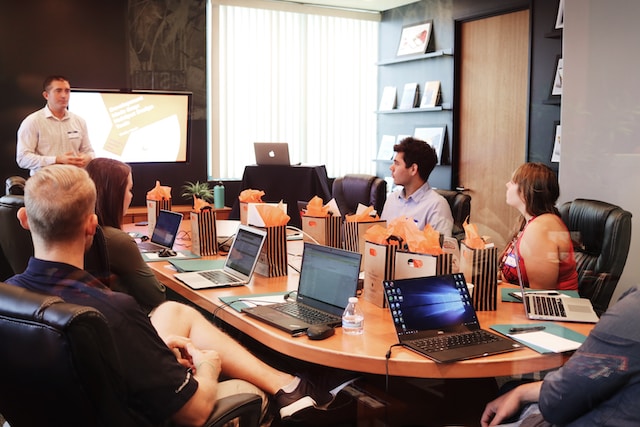Artificial Intelligence (AI) is no longer just a buzzword in the tech industry. It has become an integral part of our lives, from Siri and Alexa to self-driving cars and personalized recommendations on Netflix. But what impact does AI have on the US job market? As technology continues to evolve at an unprecedented pace, more companies are turning to AI solutions for efficiency and profitability. In this blog post, we’ll explore how AI is reshaping the US job market by examining its benefits, challenges, and potential implications for both employers and employees alike. So let’s dive in!
What is AI?
AI or Artificial Intelligence is a field of computer science that focuses on creating intelligent machines capable of performing tasks that typically require human intelligence. AI systems are designed to learn from data, identify patterns, and make decisions based on those patterns. These systems can be trained using machine learning algorithms such as neural networks.
AI technology includes several subfields such as natural language processing (NLP), image recognition, robotics, and expert systems. NLP enables computers to understand and interpret human language while image recognition allows them to recognize objects in images and videos.
Robots equipped with AI capabilities can perform a wide range of tasks from simple manual labor to complex surgeries while expert systems provide decision-making support in areas such as finance, medicine, and engineering.
AI is revolutionizing the way we think about automation by enabling machines to perform cognitive functions traditionally associated with humans. As the technology continues to evolve rapidly, it’s essential for us to consider how it will shape our future workforce dynamics.
How is AI changing the US job market?
AI is drastically changing the US job market by automating repetitive and mundane tasks. This leads to increased efficiency, accuracy, and cost-effectiveness for companies. However, it also means that certain roles will become obsolete or require less human labor.
The use of AI in recruiting software has also become prevalent. These programs can analyze resumes, identify top candidates based on specific criteria, and even conduct initial interviews through chatbots. While this can speed up the hiring process, it may also exclude qualified candidates who do not fit into predetermined algorithms.
Another industry impacted by AI is healthcare. From diagnosing diseases to creating treatment plans, machine learning algorithms are helping healthcare professionals make more informed decisions faster than ever before.
However, there are concerns about potential job loss due to automation. Many workers worry their jobs will be replaced by machines in industries such as manufacturing or transportation where physical labor is required.
While AI brings significant benefits to businesses and society at large, it’s important for policymakers to address the potential impact on employment opportunities for American workers in the future.
Benefits of using AI in the workplace
The benefits of using AI in the workplace are numerous and significant. One of the most apparent advantages is that it saves time by automating routine and repetitive tasks, giving employees more time to focus on creative or high-level work.
Moreover, AI can significantly reduce costs associated with hiring, training and retaining employees as well as increasing productivity levels. By integrating machine learning algorithms into HR processes such as recruitment and performance evaluation, employers can obtain better qualified candidates who align with company requirements quickly.
AI also allows for more accurate data analysis which provides valuable insights into customer behavior patterns resulting in improved decision-making abilities. This ensures businesses make strategic decisions based on real-time market data rather than just guesswork.
Another benefit of using AI lies in its ability to increase safety standards through predictive maintenance techniques. With machines being able to identify potential issues before they happen, companies can avoid equipment failures that could cause harm to employees or damage costly machinery.
Finally, incorporating AI technologies creates a competitive edge when compared with competitors not utilizing these advanced tools thus making your business stand out among other industry players.
The potential challenges of using AI in the workplace
As with any new technology, AI comes with its own set of challenges that must be addressed in the workplace. One potential challenge is job displacement, as automation may lead to certain jobs becoming obsolete. This could result in unemployment for workers who are unable to adapt or retrain for new positions.
Another challenge is the ethical use of AI, particularly when it comes to data privacy and bias. For example, if an algorithm is trained on biased data sets or programmed by individuals with inherent biases, it can perpetuate discrimination and unfairness in decision making.
Additionally, there are concerns about the impact of AI on mental health and well-being. The constant monitoring and surveillance enabled by AI systems can create a stressful work environment that takes a toll on employees’ mental health.
Moreover, there’s the issue of accountability – who will be held responsible if something goes wrong due to an error made by an AI system? There needs to be clear guidelines and regulations put in place to ensure transparency and accountability around the use of these technologies.
While there are certainly benefits to using AI in the workplace, it’s important that we address these challenges proactively so as not to exacerbate existing issues or create new ones altogether.
Conclusion
AI is reshaping the US job market in ways that were unimaginable just a few years ago. While some jobs may be threatened by automation, there are many benefits to using AI in the workplace such as increased productivity and efficiency. However, it’s important for companies to also consider potential challenges like ethical concerns and job displacement.
The key takeaway from this overview is that while AI technology continues to advance at an unprecedented rate, it’s up to us as individuals and organizations to adapt accordingly. By embracing new opportunities presented by AI and actively working towards solutions for its challenges, we can ensure a bright future for both businesses and workers alike.




